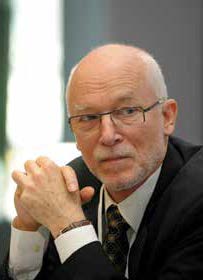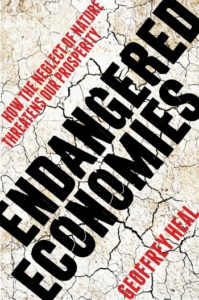Interview with Geoffrey Heal
Union of Concerned Scientists (USC) www.ucsusa.org.

Geofrey Heal. Photo: © European Union
Geoffrey Heal is a UCS board member, a professor at Columbia business school, and a leading expert on economics in the environment. He chaired a national Academy of Sciences committee on ecosystem services and is a coordinating lead author for the Intergovernmental Panel on Climate Change. He is also the author of 19 books including Endangered Economics: How the Neglect of Nature Threatens Prosperity, recently published by Columbia University Press.
Your new book, Endangered Economies, makes a compelling argument that our current economic systems don’t adequately take into account our dependence on the natural world. Can you explain that a bit more?
GEOFFREY HEAL: The natural world provides everything we depend on. We get our food from the natural world, we get our drinking water and our oxygen from the natural world, and we evolved as part of it. We simply can’t live without it. Plants create food, and they need pollination from insects, and they need rain, and they need soil. We can’t synthesize these things. So we really are totally dependent on the natural world in the end.
The strange thing is that people don’t acknowledge that more. You know, most of us now live in cities. We don’t see much nature. We are very embedded in our latest technologies, such as our computer networks and our cell phones. There’s a sense that we’re so technologically sophisticated that we don’t depend on the natural world anymore. But that’s actually not true: we need it as much as our ancestors did and for the same reasons.
 So, what do you see as the consequences of ignoring nature?
So, what do you see as the consequences of ignoring nature?
HEAL: Well, quite simply, if we don’t make some changes in the way we organize our economic systems, I believe we will see catastrophic environmental change in our lifetimes—catastrophic for us. The good news is that, by making a few very achievable alterations to correct some egregious flaws in our economic system, we can go far toward ending this threat to our environment and our prosperity.
Let’s talk more specifically about this. In the book, you call climate change the “greatest externality in history.” What do you mean by that?
HEAL: An “externality” is a word economists use to describe a situation in which my actions impose a cost on you, but that cost is one that I don’t take into account. So, in the case of climate change, if you’re an oil company and I’m a consumer buying gasoline for my car, neither of us takes into account the fact that this gasoline will change the climate. It is external to—or omitted from—the transaction. People who burn fossil fuels impose costs on virtually everyone else in the world by changing the climate. It’s a massive impact because it is affecting every being in the world, changing the planet for everything that is alive on it.
One of the key points I make in the book is that external costs pose the biggest threat to the environment, because they prevent nature and the economy from working together. We simply can’t afford to continue to ignore this harmful error in our economic policies. The good news is that there are many ways to solve a problem like this.
In other words, you’re saying there’s a numbers-based, economic case for profiting from the conservation of the natural world?
HEAL: Absolutely. There’s a moral case for protecting the environment, of course, but I show in the book that correcting some relatively basic errors in the way we account for things can make a world of difference in terms of dollars and cents. I’m arguing, essentially, that we need to get back to our fundamental capitalist principles. For an economic system to be viable in the long run, we need to make certain that everyone’s accounting is done properly, to account for all the costs they generate. That’s the way an economic system is supposed to work, going back to Adam Smith’s ideas in 1776 in The Wealth of Nations. But we’ve drifted away from it. We are letting too many people forget some of the important costs that they impose on us.
There’s some prescient discussion in your book about the power of the fossil fuel lobby and anti-environmentalism in the fossil fuel industry, especially given the recent election.
HEAL: Yes. Environmental issues really only became as partisan as they seem to be now relatively recently, since Ronald Reagan and coinciding with the rise of power of the fossil fuel industry.
A lot of the problem frankly has to do with the attempted manipulations of science by the tobacco industry and more recently the fossil fuel industry. These industries have sought to cast doubt on the scientific evidence that smoking causes cancer and that burning fossil fuels causes climate change. They have worked so hard to accomplish this that people have become reluctant to take that scientific evidence at face value.
One of the striking things in your book is your contention that preserving the natural world need not be expensive.
HEAL: Right. Let’s take the concrete example of climate change: we all know that, to avoid the worst consequences, we have to move significantly away from fossil fuels. Well, today, the cheapest ways of producing electricity in significant parts of the world are by using wind and solar. In the southern United States, you can produce solar power for roughly four cents per kilowatt-hour; in the Middle East you can produce it for about three cents, whereas natural gas will cost you five or six cents, and coal and oil will cost even more than that. The least expensive power stations in the United States today are wind power stations generating electricity that costs about 3.5 cents per kilowatt-hour—roughly half the price of what it costs from the latest efficient natural gas power station, even at a time when natural gas is selling at a historically low price.
Plus, of course, the cost of not moving away from fossil fuels is clearly associated with huge costs from sea level rise, wildfires, droughts, potentially more serious storms, the spread of tropical and subtropical diseases, plus the extinction of a large number of species.
So, anyone looking at the full economic picture can see that changing to clean energy is going to lower our costs rather than raise them. There is an investment we have to make in new equipment, but once we do this our energy will be less expensive. The picture becomes even clearer if we count these costs currently considered “externalities,” if we consider the economic value of the natural capital involved in our economy, and if we shift the way we make economic measurements to more fully represent what’s going on.
My point is that some of these simple changes that I elaborate on in the book can go far to allowing humans and nature to prosper together.








Leave a Reply